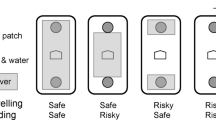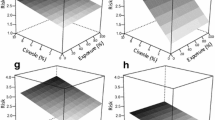Summary
Risk-sensitive foraging theory predicts that predators which face starvation if there is a temporary shortfall in their food supply should choose feeding sites on the basis of variation in as well as mean expected reward rate. For a given mean reward rate they should choose high variance feeding sites (be risk-prone) if they are running below energy requirement, but low variance sites (be risk-averse) if they are running above.
Common shrews presented with a choice between constant and variable feeding stations were more likely to visit the variable station when they were running below energy requirement and more likely to visit the constant station when they were running above. However, the tendency towards risk-aversion above requirement was greater than that towards risk-proneness below.
When all shrews were considered together, the probability of visiting the variable station correlated negatively and continuously with intake relative to requirement.
Similar content being viewed by others
References
Caraco T (1981) Energy budgets, risk and foraging preferences in dark eyed juncos (Junco hyemalis). Behav Ecol Sociobiol 8:213–217
Caraco T (1982) Aspects of risk-aversion in foraging white-crowned sparrows. Anim Behav 30:719–727
Caraco T (1983) White-crowned sparrows (Zonotrichia leucophrys): foraging preferences in a risky environment. Behav Ecol Sociobiol 12:63–69
Caraco T, Martindale S, Whittam TS (1980) An empirical demonstration of risk-sensitive foraging preferences. Anim Behav 28:820–830
Crowcroft P (1957) The Life of the Screw. Reinhardt, London
McNamara J, Houston AI (1982) Short-term behaviour and life-time fitness. In: McFarland DJ (ed) Functional outogeny. Pitman, London
Pulliam HR, Millikan GC (1982) Social organization in the non-reproductive season. In: Farner DS, King JR (eds) Avian biology, vol 6. Academic Press, New York
Stephens DW (1981) The logic of risk-sensitive foraging preferences. Anim Behav 29:628–629
Stephens DW, Charnov EL (1982) Optimal foraging: some simple stochastic models. Behav Ecol Sociobiol 10:251–263
Vogel P (1976) Energy consumption of European and African shrews. Acta Theriol 21:195–206
Author information
Authors and Affiliations
Rights and permissions
About this article
Cite this article
Barnard, C.J., Brown, C.A.J. Risk-sensitive foraging in common shrews (Sorex araneus L.). Behav Ecol Sociobiol 16, 161–164 (1985). https://doi.org/10.1007/BF00295150
Received:
Accepted:
Issue Date:
DOI: https://doi.org/10.1007/BF00295150




